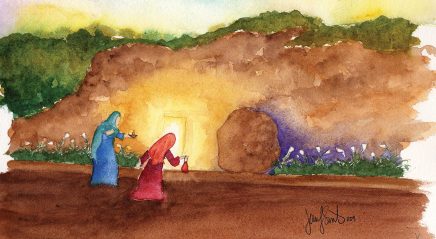Like a one-wish genie, Jesus asks the loud man in the crowd, “What do you want me to do for you?” The man who was blind replies, “My teacher, let me see again” (Mark 10:51).
This is a courageous request. Many sighted people become adept at keeping certain things invisible—“out of sight, out of mind.” Other things stay trapped in time, with conclusions sealed in plastic to eliminate the threat of change. We often see only what we expect or want to see. When we “see again,” we run the risk of having to remake the world, a messy business.
This brave man asks for precisely what his teacher, Jesus, has been trying to give his students. Throughout Mark’s Gospel, miracles and parables and controversies showcase a completely different and stunning way of perceiving reality. Jesus calls it “the kingdom of God.” For the last two and a half chapters—which Mark artfully brackets with incidents in which a blinded man regains his sight—Jesus focuses on getting his disciples to see again.
This month’s Gospel readings from Mark 10 are visually jolting. Jesus twists a tired question about divorce so that it opens a window into the soul of marriage. Women aren’t property—they are powerful partners. Children aren’t bothersome liabilities—they are blessed kingdom leaders. Riches aren’t a reward—they are an obstacle. Success isn’t getting more—it’s letting go. Power is not position—it’s servanthood. The loathsome way of the cross is God’s wisdom walk. Glory lives on death row.
Autumn, when everything shrivels and dies, is explosively beautiful as it does what the rich young man in Mark cannot: let go, scattering resurrection everywhere.
To see again like this is a miracle indeed.
Jesus is still opening eyes. Only recently have I learned that values I internalized as a child—pursuing objectivity, keeping quiet to avoid conflict, and distrusting and overcoming feelings, perfectionism and perpetual urgency—are cultural signatures of white supremacy. It hurts to see.
The COVID-19 pandemic has spotlighted our society’s addictions, heroes and possibilities. Political polarization has revealed true colors. Our church keeps shrinking and aging, becoming more nimble, creative and wise. That grief you try to avoid and deny is the residue of love. That person you can’t stand is a child of God. That rotten news brings a fresh opportunity.
Autumn, when everything shrivels and dies, is explosively beautiful as it does what the rich young man in Mark 10 cannot: let go, scattering resurrection everywhere. The color-drenched forest confirms the cross: glory lives amid death. The end is just the beginning.
What God is doing can be hard, even impossible, for us to see, much less accept or trust. “For mortals it is impossible, but not for God,” Jesus says. “For God, all things are possible” (Mark 10:27). Oh Teacher, let us see again.









